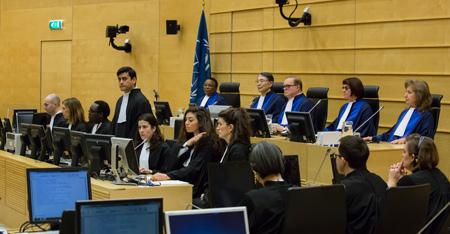Lubanga case: ICC Appeals Chamber amends the Trial Chamber’s order for reparations to victims

Situation: Democratic Republic of the Congo (DRC)
Case: The Prosecutor v. Thomas Lubanga Dyilo
Today, 3 March 2015, the Appeals Chamber of the International Criminal Court (ICC) delivered, in open court, its judgment on the appeals against the Trial Chamber's "decision establishing the principles and procedures to be applied to reparations" in the case against Thomas Lubanga Dyilo. The Appeals Chamber amended the Trial Chamber's order for reparations and instructed the Trust Fund for Victims (TFV) to present a draft implementation plan for collective reparations to the newly constituted Trial Chamber I no later than six months from the issuance of today's judgment.
On 7 August 2012, Trial Chamber I decided, for the first time in proceedings at the ICC, on the principles that are to be applied to reparations for victims in the context of the case against Thomas Lubanga Dyilo and ordered collective reparations to victims to be made through the TFV. Mr Lubanga was found guilty, on 14 March 2012, of the war crimes of enlisting and conscripting children under the age of 15 years and using them to participate actively in hostilities. He was sentenced on 10 July 2012 to a total of 14 years of imprisonment, and, on 1 December 2014, the Appeals Chamber confirmed, by majority, the verdict declaring Mr Lubanga guilty as well as the sentencing decision.
In the delivery of its judgment and the amended order today, Judge Erkki Kourula, Presiding Judge, explained that the Appeals Chamber established the necessary minimum elements required of a reparations order, and the principles governing the reparations for victims, including the fact that all victims are to be treated fairly and equally as regards reparations, irrespective of whether they participated in the trial proceedings. The Appeals Chamber confirmed the Trial Chamber's finding that reparations programmes should include measures to reintegrate former child soldiers in order to eradicate the victimisation, discrimination and stigmatisation of these young people. It also highlighted that a gender-inclusive approach should guide the design of the principles and procedures to be applied to reparations. The Appeals Chamber found that the Trial Chamber did not err in deciding to award reparations only on a collective basis, and not on an individual basis, and highlighted that the number of victims is an important factor in determining that reparations on a collective basis are more appropriate.
The Appeals Chamber upheld the Trial Chamber's finding that the victims of the crimes, whether or not they participated in the trial or filed requests for reparations, should be able to participate, together with those members of their families and communities who meet the criteria of eligibility for reparations, in the collective reparation awards. The Appeals Chamber amended the Trial Chamber's order to include an instruction to the TFV that it consult with victims who participated at trial and submitted individual requests on issues relating, inter alia, to the design and nature of the collective reparations awards. Further, the Appeals Chamber confirmed the Trial Chamber's finding that, whenever possible, reparations should reflect local cultural and customary practices unless these are discriminatory, exclusive or deny victims equal access to their rights and that reparations awarded through the Court do not interfere with the responsibility of States to award reparations to victims under other treaties or national law.
The draft implementation plan that the TFV is instructed to submit should include the anticipated monetary amount that it considers would be necessary to remedy the harm caused by the crimes for which Mr Lubanga was convicted. The Appeals Chamber found that the Trial Chamber erred in not making Mr Lubanga personally liable for the collective reparations due to his current state of indigence. The Appeals Chamber held that reparation orders must establish and inform the convicted person of his personal liability with respect to the reparations awarded in an order, and that if the Trust Fund for Victims advances its resources in order to enable the implementation of the order, it will be able to claim the advanced resources from Mr Lubanga at a later date. The Appeals Chamber confirmed the Trial Chamber's instruction that, in designing the reparations awards, the Trust Fund should consider providing medical services (including psychiatric and psychological care) along with assistance as regards general rehabilitation, housing, education and training. Reparations need to support programmes that are self-sustaining in order to enable victims, their families and communities to benefit from these measures over an extended period of time.
The Appeals Chamber confirmed the principle established by the Trial Chamber, that reparations are to be awarded based on the harm suffered as a result of the commission of any crime within the jurisdiction of the Court. One question considered by the Appeals Chamber was whether sexual violence could be defined as a "harm" resulting from the crimes for which Mr Lubanga was convicted. The Appeals Chamber considered that, as Mr Lubanga was not convicted for crimes of sexual violence and because sexual violence was not included within the gravity of the crimes for which he was convicted for purposes of sentencing, it could not. However, this does not preclude victims of sexual violence from being able to benefit from assistance activities of the TFV, according to the discretionary assistance mandate of the Fund. The draft implementation plan made by the TFV should also include a referral process to competent NGOs in the affected areas that offer services to victims of sexual and gender-based violence.
For further information on the case, click here.
Questions and Answers, Appeals judgment on reparations in the Lubanga case, 3 March 2015
Audio-visual materials:
Appeals Chamber hearing
"Ask the Court" Programme (in French)
For further information, please contact Fadi El Abdallah, Spokesperson and Head of Public Affairs Unit, International Criminal Court, by telephone at: +31 (0)70 515-9152 or +31 (0)6 46448938 or by e-mail at: [email protected].
You can also follow the Court's activities on YouTube and Twitter